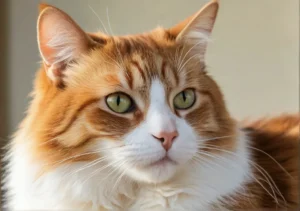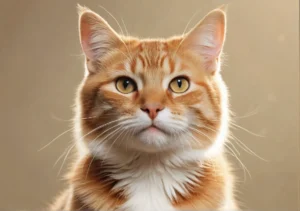Cats are known for their unique vocalizations, from meows to purrs to hisses. But what happens when a cat suddenly loses its voice? It can be concerning for cat owners to witness their normally chatty feline companion become silent. In this blog post, we will explore the reasons why cats may lose their voice, as well as what steps can be taken to help them regain their vocal abilities.
Common Causes of Feline Hoarseness
Have you ever wondered why your feline friend suddenly sounds like a tiny croaky frog? Well, there are a few common reasons why cats may experience hoarseness or even lose their voice altogether.
Respiratory Infections: Just like us humans, cats can also suffer from respiratory infections that can affect their vocal cords. If your cat’s voice change is accompanied by sneezing, coughing, or nasal discharge, it’s crucial to consult your veterinarian for proper diagnosis and treatment.
Laryngitis: Yes, cats can get laryngitis too! This inflammation of the larynx can cause their voice to become hoarse or disappear completely. In most cases, rest and proper hydration can help improve their condition, but a vet visit is always recommended to rule out any underlying issues.
Vocal Cord Issues: Sometimes, cats may experience issues with their vocal cords due to trauma, growths, or even neurological conditions. If your feline friend’s voice change persists or is accompanied by other concerning symptoms, it’s best to seek professional veterinary advice for a thorough evaluation.
Remember, our furry companions can’t tell us when something is wrong, so it’s essential to pay attention to changes in their behavior and vocalizations. Your cat’s voice may be their way of telling you something isn’t quite right, so always take any voice changes seriously.
How Stress Can Impact a Cat’s Vocalizations
Stress isn’t just a human problem – our feline friends can also feel the weight of anxiety, which can manifest in various ways, including changes in their vocalizations.
When a cat is stressed, their vocalizations may become strained or even disappear altogether. This is their way of communicating their discomfort or anxiety. To help reduce stress in your feline companion and potentially prevent voice loss, consider the following tips:
Create a Safe Space: Providing a quiet, comfortable space where your cat can retreat and relax can help reduce their stress levels significantly. Make sure this area is away from loud noises and other potential stressors.
Regular Play and Exercise: Physical activity is an excellent way to alleviate stress in cats. Engage your furry friend in interactive play sessions and provide opportunities for exercise to help them release pent-up energy and tension.
Calming Techniques: Consider introducing calming aids such as pheromone diffusers or calming treats to help your cat relax in stressful situations. These can be particularly beneficial during events that are known to trigger anxiety, such as vet visits or loud noises.
By addressing and reducing stress in your cat’s environment, you can help maintain their vocal health and overall well-being. Remember, a happy and relaxed cat is more likely to have a strong and healthy voice – meow away, little friend!
The Role of Allergies in Cat Vocalization Problems
Allergies can play a significant role in causing cats to lose their voices. Just like humans, cats can be allergic to various environmental factors such as pollen, dust, mold, or even certain foods. When a cat is exposed to allergens, it can lead to inflammation in their throat, resulting in hoarseness or complete loss of voice.
To manage allergens in your cat’s environment, consider using air purifiers to filter out airborne allergens, regularly cleaning your home to reduce dust and mold, and ensuring your cat’s bedding is washed frequently. Additionally, if you suspect a food allergy, consult your veterinarian to discuss potential dietary changes.
Remember, identifying and managing allergies can help prevent vocalization problems in your cat and improve their overall quality of life.
Solutions for Cat Hoarseness
If your cat is experiencing hoarseness or has completely lost its voice, there are several solutions that can help them regain their vocal abilities.
One option is to consult your veterinarian for a thorough examination to identify any underlying health issues causing the problem. Your vet may recommend treatments such as antibiotics for infections or anti-inflammatory medications to reduce inflammation in the throat.
Home remedies can also be beneficial in soothing your cat’s throat. Consider offering warm, wet food to help lubricate their throat, ensuring they stay hydrated, and creating a quiet and stress-free environment for them to rest and recover.
Remember, early intervention and proper care can help your cat recover their voice and prevent future vocalization problems.
- Use a humidifier to keep the air moist and soothing for your cat’s throat.
- Encourage your cat to rest and avoid excessive meowing or vocalization.
- Provide plenty of fresh water to keep your cat hydrated and support throat health.
For more in-depth information on cat health and wellness, check out this helpful resource from the American Society for the Prevention of Cruelty to Animals (ASPCA): ASPCA Online Cat Care Resources.
The Importance of Vocal Care for Cats
Regular veterinary check-ups are like the cat’s version of a wellness retreat. These visits are crucial for maintaining your feline friend’s ability to meow, purr, and communicate effectively. Just like we need our voices to chat with pals, cats rely on theirs to express themselves. So, don’t skip those vet appointments! Help your furry buddy stay chatty and healthy.
Preventative Measures for Cat Vocal Issues
Aside from regular check-ups, there are actions you can take at home to keep your cat’s voice box in top-notch shape. Firstly, ensure your cat stays hydrated. Dehydration can lead to hoarseness or even loss of voice. Second, be mindful of the temperature in your house. Dry air can irritate a cat’s throat, affecting their vocal cords. Lastly, limit exposure to irritants like cigarette smoke, strong scents, or dusty environments to protect your feline friend’s precious vocal cords.
For more information on cat vocal issues, including tips on recognizing potential problems and seeking treatment, check out the American Association of Feline Practitioners’ guide: Feline Vocalization: Excessive Vocalization, Low Vocalization, or No Vocalization.
Fun Feline Vocalization Facts
Did you know that cats have over 100 different vocal sounds in their repertoire? From meows to purrs to chirps, our feline friends sure have a wide range of communication skills! Contrary to popular belief, cats don’t meow to each other—they reserve this unique sound specifically for their human companions. Next time your cat “talks” to you, remember how special that connection truly is!
Our Top Tips for Cat Wellness
Maintaining your cat’s vocal health is essential for their overall well-being. One key factor that can lead to cats losing their voice is excessive meowing, which may indicate underlying health issues or stress. To promote vocal health in your furry friend, ensure they have a balanced diet, regular exercise, and plenty of mental stimulation. Additionally, try to create a calm and safe environment to reduce their stress levels, helping them communicate effectively and happily. Remember, a healthy cat is a chatty cat!
- Regular Vet Check-ups: Schedule routine visits to the vet to catch any vocal issues early.
- Provide Mental Stimulation: Interactive toys and playtime can keep your cat engaged and happy.
- Quality Nutrition: Choose high-quality food to support your cat’s overall health and well-being.
- Stress Management: Creating a peaceful environment can help reduce excessive meowing and vocal strain.
- Hydration is Key: Ensure your cat has access to fresh water at all times to prevent dehydration.
Remember, a happy and healthy cat is more likely to vocalize appropriately and maintain their “voice” in your lives.
For more tips on cat wellness, consult this thorough guide from the American Society for the Prevention of Cruelty to Animals (ASPCA): ASPCA Cat Care.
Alex, a passionate animal lover, has experience in training and understanding animal behavior. As a proud pet parent to two dogs and three cats, he founded AnimalReport.net to share insights from animal experts and expand his knowledge of the animal kingdom.




